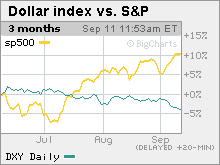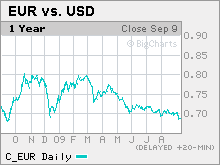Dollar falls to one-year low
The greenback remains weak despite a selloff on Wall Street as investors flock to the Japanese yen for safety.
NEW YORK (CNNMoney.com) -- The dollar fell to a one-year low against a basket of currencies in volatile trading Friday as safe-haven demand evaporated and investors fret about the stability of the U.S. currency.
The greenback took a beating earlier this week as investors flocked to higher yielding assets such as stocks and commodities. Because the dollar is seen as a safe haven, it tends to lose ground when investors become more confident and shift money into more risky markets.
At the same time, traders are concerned about the dollar's long-term prospects as the U.S. budget deficit continues to explode and foreign central banks grow nervous about their holdings of the U.S. currency.
"This week we saw aggressive selling of U.S. dollars as the market sifted away from trading the dollar based on risk and is now looking at U.S. fundamentals," said Kathy Lien, head of currency research at Global Forex Trading.
But the tone turned more cautious Friday afternoon as a sharp drop in the price of oil dragged down the major stock indexes, all of which had closed at 11-month highs in the previous session.
"There's a lot of fear and trepidation that the recovery is in place," Lien said. "There's still a lot of risk for U.S. economy."
The afternoon jitters helped boost the Japanese yen, which has gained stature recently as the safe-haven currency of choice. The yen was up 1.3% against the dollar to ¥90.54.
Meanwhile, the dollar was down 0.1% versus the euro at $1.4582 after the European currency hit a 2009 high of $1.4627 earlier. Against the pound, the dollar was down 0.2% to $1.6678
The Dollar Index (DXY), which tracks the greenback versus the euro, yen and four other currencies, fell 0.3% to 76.60. Earlier, the index hit 74.46 -- its lowest level in nearly a year.
The dollar came under pressure early Friday after a report suggested consumers were more confident than expected in August. The University of Michigan's initial reading on August consumer sentiment rose to 70.2, versus a 67.5 estimate.
Separately, the government reported a smaller-than-expected budget deficit in August. The Treasury Department recorded a $111.4 billion deficit last month, versus forecasts for a $139.5 billion shortfall.
Looking ahead, Lien said the market will focus on next week's report on August retail sales, which should help determine "whether the dollar will trade on risk or fundamentals." ![]()



